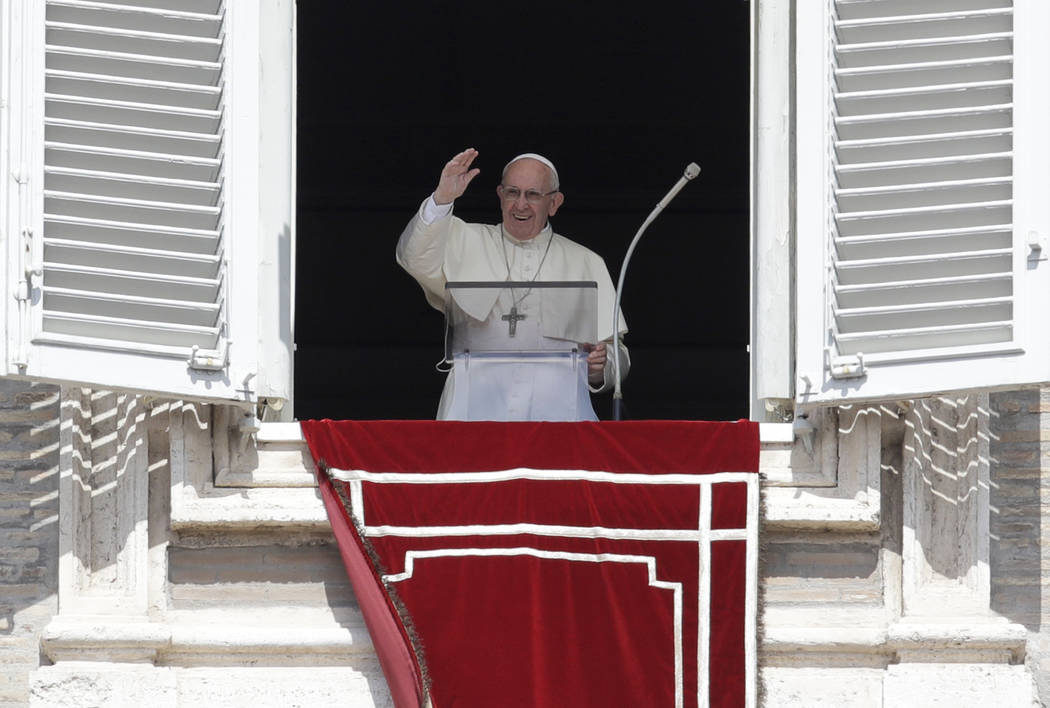Vatican pushes back against official who accused pope of sex abuse cover-up

VATICAN CITY — The Vatican is starting to push back against Archbishop Carlo Maria Vigano, author of the bombshell accusation of sex abuse cover-up against Pope Francis, with a statement Sunday from its former spokesman about a controversial 2015 meeting Vigano organized.
The Rev. Federico Lombardi and his English-language assistant, the Rev. Thomas Rosica, issued a joint statement disputing Vigano’s claims about the encounter he organized with American anti-gay marriage campaigner, Kim Davis, during Francis’ September 2015 visit to the United States.
News of the Davis audience made headlines at the time and was viewed by conservatives as a papal stamp of approval for Davis, the Kentucky clerk at the center of the U.S. gay marriage debate. The Vatican furiously sought to downplay it, with Lombardi saying the meeting by no means indicated papal support for Davis and insisting that the only private audience Francis held in Washington was with his former student: a gay man and his partner.
The Sept. 24, 2015 meeting and ensuing controversy has been cited as evidence of the frosty relations between Vigano and Francis that predated Vigano’s remarkable denunciation of how Vatican officials starting in 2000 knew of sexual misconduct allegations against ex-Cardinal Theodore McCarrick but covered them up.
Vigano, whose Aug. 26 claims that Francis knew about McCarrick starting in 2013 have thrown the papacy into turmoil, issued a second statement Aug. 30 saying Francis knew well who Davis was, and that the Vatican hierarchy approved the meeting in advance.
He said he was nevertheless summoned to Rome urgently after news of the meeting was leaked but said the pope had nothing but praise for his efforts organizing the trip when the two met Oct. 9, 2015.
In the joint statement Sunday, Rosica transcribed what he said were handwritten notes from a meeting he and Lombardi had with Vigano the following evening. In those notes, Rosica quoted Vigano as telling them that the pope had actually chastised him for “deceiving” him with the Davis encounter, and for having withheld the fact that Davis had been married four times.
In his part of the joint statement, Lombardi said Vigano initiated the Davis meeting, should have known about the furor that it would cause, and that even though Vatican officials approved of it, they were not sufficiently informed about the significance such a meeting would take on.
The meeting has taken on new relevance following Vigano’s allegations that he informed Francis of McCarrick’s misconduct on June 23, 2013, but claimed Francis rehabilitated him from sanctions he said Pope Benedict XVI had imposed on him in 2009 or 2010.
There is no evidence those sanctions were ever enforced, since McCarrick lived a very public ministry in those years, travelling around the world for the church. Vigano said Francis should resign for what he said was his complicity in the nearly two-decade long cover-up of McCarrick’s misconduct.
Francis removed McCarrick as cardinal in July after a U.S. investigation determined an allegation he groped a teen-ager in the 1970s was credible. Up until then, the only accusations known publicly against McCarrick were of misconduct with adults, an abuse of power but considered much less serious than sexually abusing a minor in the eyes of the church.
Rosica said no Holy See officials were involved in the drafting of the statement with Lombardi, but that he shared a copy of it with the Vatican secretary of state and foreign minister. The statement was issued, perhaps coincidentally, on the same day as the announcement that Lombardi would be resuming a more prominent communications role for the church by returning to work at the Jesuit journal, La Civilta Cattolica.
The magazine is edited by one of Francis’ closest advisers, the Rev. Antonio Spadaro, and serves as something of an unofficial mouthpiece for the Vatican. Its content is vetted by the Vatican secretariat of state prior to publication.